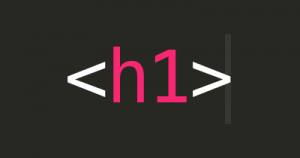Apart from its SEO implications, the H1 tag plays a crucial role in communicating the page’s primary message to visitors. A clear and concise H1 tag improves the overall user experience by providing a quick understanding of the page’s content. This not only aids in retaining visitors but also contributes to lower bounce rates, another metric search engines consider in their ranking algorithms.
Structural Hierarchy and SEO
Search engines analyze the structural hierarchy of a webpage to determine its relevance and organization. Proper use of H1 tags in alignment with other heading tags (H2, H3, etc.) creates a logical structure that search engines appreciate. This organized hierarchy not only aids in SEO but also enhances the readability of your content, catering to both search algorithms and human readers.
Best Practices for Optimizing H1 Tags
To maximize the SEO benefits of H1 tags, consider incorporating long-tail keywords and phrases that reflect the intent of your content. Ensure that each page has a unique H1 tag, avoiding duplications across your site. Striking a balance between keyword optimization and natural language is key to creating H1 tags that resonate with both search engines and your target audience.
In conclusion, the H1 tag is a fundamental element in on-page SEO, influencing both search engine algorithms and user experience. By crafting informative and keyword-rich H1 tags, you can improve your website’s visibility, enhance user engagement, and ultimately boost your SEO ranking. Stay attuned to evolving SEO trends to adapt your H1 tag strategies for continued success.
Enhancing Keyword Relevance
The H1 tag serves as a prime opportunity to reinforce the relevance of your content to targeted keywords. Carefully select keywords that align with the central theme of your page and integrate them seamlessly into your H1 tag. This not only aids search engines in understanding the context of your content but also reinforces the topical authority of your page. Strive for a balance between incorporating keywords naturally and maintaining a compelling headline that captivates your audience.
Mobile Responsiveness and H1 Tags
In the era of mobile-first indexing, optimizing H1 tags for mobile responsiveness is paramount. Search engines prioritize mobile-friendly content, and a well-optimized H1 tag contributes to a positive mobile user experience. Ensure that your H1 tag remains concise yet impactful on smaller screens, avoiding lengthy headlines that might hinder readability. A mobile-friendly H1 tag not only supports your SEO efforts but also caters to the growing number of users accessing the internet on mobile devices.
H1 Tags and Rich Snippets
Crafting compelling H1 tags can also enhance the chances of your content being featured in rich snippets—those concise, information-packed results displayed at the top of search engine results pages. When search engines identify your H1 tag as a clear representation of the page’s content, they are more likely to showcase it in featured snippets. This increased visibility can lead to higher click-through rates and greater visibility for your website.
Monitoring and Iterating H1 Tags
SEO is an ongoing process, and regularly monitoring the performance of your H1 tags is essential. Leverage analytics tools to assess the impact of your H1 tags on search rankings and user engagement. If certain pages are not performing as expected, consider revisiting and refining the corresponding H1 tags. Stay adaptable to changes in search engine algorithms and user behavior, ensuring that your H1 tags evolve to align with emerging trends and best practices in SEO.
Continuously refining your approach to H1 tags based on data-driven insights and industry developments will position your website for sustained success in the competitive landscape of search engine optimization.




